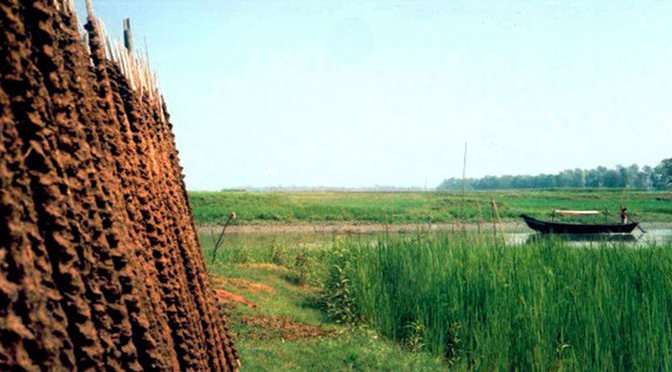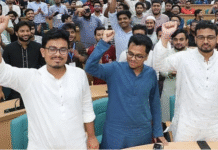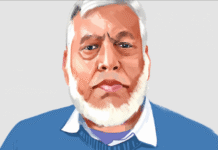By Kazi Anwarul Masud*
The world is passing through a stage of conundrum.
With the passage of the world order that prevailed since the Second World War the American predominance in global affairs is on the wane. However much denied by the likes of Robert Kagan, Niall Ferguson and their fellow travelers who would like the US to be an imperialist power in disguise the fact remains that the US today has to share its influence with emerging economies like China, India, Brazil, a recalcitrant Russia and no less importantly ISIS, the Taliban, and host of other who are disturbing the global peace in the name of religion.
Obama administration is aiming at concluding a Trans-Atlantic Treaty that would, in the opinion of some, is a frontal assault on democracy (The Guardian-George Monibot- November 2013). The purpose of the Transatlantic Trade and Investment Partnership is to remove the regulatory differences between the US and European nations.
In particular the mechanism through Investor-State Dispute Settlement which provides for an arbitration court consisting of private individuals are entrusted with the power to review, without any restriction or appeal procedure, all actions of the government, all decisions of the courts, and all laws and regulations emanating from parliament. There are no corresponding rights for citizens. The people cannot use these tribunals to demand better protections from corporate greed. As the Democracy Center says, this is “a privatized justice system for global corporations”.
The other school including the European Commission believes that passage of the Transatlantic Trade Pact could boost trade by 50% for each bloc. The United States and European Union together represent 60% of global GDP, 33% of world trade in goods and 42% of world trade in services. A free trade area between the two would represent potentially the largest regional free-trade agreement in history, covering 46% of world GDP. The grueling negotiations are yet to end and a deal is yet to reach the US Congress and the European Parliament and those of EU members.
This distraction to Transatlantic Partnership and one desired by the US of a Transpacific Partnership is to emphasize the point that the world today gives more priority to the bread and butter issues than aberrant destructive acts of some sociopaths terrorizing parts of the world giving life to Samuel Huntington’s thesis of civilizational conflicts spreading their cancerous cells throughout the world. Some of these irreparably damaged minds are calling for jihad that, as analyzed by Benjamin Barber (Jihad vs. Mcworld) essentially puts forward the conflict of consumerist capitalism as opposed to religious and tribal fundamentalism. Some of the same class of people has wrought death and destruction to the people in the name of giving the people back their “lost” democratic rights.
In Bangladesh we are experiencing the latter kind of mindless violence resultant of adamant attitude of violence laced movement( general people are increasingly getting disinterested in the calls for strike and seize) faced with the government’s possible decision to treat the violence as terrorism and refusing to sit with the opposition political parties for any dialogue.
There appears to be sound logic in the government’s refusal to sit for a dialogue. Pakistan does not sit for dialogue with Tehrik-e-Taliban Pakistan (TTP) nor does the coalition of the Middle Eastern countries assisted by US air strikes and other Western powers have any dialogue with ISIS or the Nigerians with Boko Haram terrorists.
So long the opposition political parties do not come out of the grip of terrorism it would be immoral and possibly illegal for the authorities to have any dialogue with them. The present situation in Bangladesh is similar to Joseph Heller’s famous book Catch-22 which refers to any illogical or paradoxical problem or situation or a “a vicious circle wherein an absurd, no-win choice, particularly in situations in which the desired outcome of the choice is an impossibility, and regardless of choice, a same negative outcome is a certainty” . World history does not provide examples of negotiation with violence till the perpetrators have abjured violence (we have the example of Shantu Larma giving up violence in favor of negotiations in Chittagong Hill Tracts).
Politics, if not satirically described as conduct of public affairs for private gains, is meant for the welfare of the people. So it is possible to have negotiations with former terrorists. In Afghanistan the authorities and the US are willing to talk with the former Taliban. It can be done here as well. But to arrive at this stage BNP-Jamaat combine have to cease killings of the innocent, destruction of property and causing loss to the economy. They have to stop terrorism in all its forms. Only then can an atmosphere for a dialogue can be formed.
The decisions by BNP to support candidates for the city elections in Dhaka and Chittagong appear to be a positive indicator in an otherwise political conflict ridden country. Bangladesh government has decided to revise growth rate from 7.3% to 6.8%. ADB assessment is 6.1% from 6.4% while Bangladesh Bank revised down growth rate to 6.1%. This means that unless Bangladesh can come out of the 6% constraint and raise growth rate to at least 8% it would be difficult to achieve the target of medium income country in a decade or two. Despite having the advantage of democratic dividend( out of a population of 160 million 93 million are under the age of 28 years) this mass of people if better educated and trained, preferably abroad, can be an asset to the country’s development, more so, as we need 8% remittance growth.
Bangladesh is an investment friendly country yet both foreign and domestic investment have not been ideal for various reasons e.g. lack of infrastructure, difficulty in doing business, unpredictability of return on investment due to current political turmoil etc have added as a disincentive for lack of investment.
Japan External Trade Organization (JETRO) in a recent survey reported that more than seventy percent Japan affiliated companies in China would like to shift their operation to Bangladesh as well as India, Vietnam and Thailand. The survey, however, stressed improving worker efficiency in the country by providing basic education and vocational training.
Among the countries surveyed, Bangladesh ranked the lowest in quality of employees. The average rate of workers’ productivity in Bangladesh is 31.6 percent, while it is more than double in Sri Lanka, in Pakistan, and slightly more in China and in India. While Bangladesh like any other developing country aims at improving its national wealth the authorities also have to be careful about distribution of wealth. GINI coefficient that measures inequality of income between different groups of people increased from 0.467 in 2005 to 0.458 in 2010. And the richest 5% households possess 24.61% while the poorest 5% have only to 0.46 in the 2000s of total income.
While it is debatable whether poverty is the principal reason for religious extremism there is no doubt that religious extremism has flourished in Muslim countries e.g. Pakistan( Tehrik-e-Taliban Pakistan), Nigeria( Boko Haram), Afghanistan( Taliban), Yemen( Taliban in Northern Africa), and currently the most brutal ISIS( Iraq and Syria).
Pew Research Center in January 2012( Religious Extremism and Development) measuring Social Hostility Index measured in terms of acts of religious hostility by private individuals, organizations or groups in society including religion-related armed conflict or terrorism, mob or sectarian violence, harassment over attire for religious reasons or other religion-related intimidation or abuse mentioned India’s Hindu Jagarana Vedike, enforcing a morality code, including an attack on young men and women for allegedly drinking and dancing at a birthday party in the state of Karnataka in July 2012 .Additionally the “ghar wapasi”(return to the fold) program has become controversial both in India and abroad.
The Pew report also included six countries with very high social hostilities in 2012– Syria, Lebanon, Sri Lanka, Bangladesh, Thailand and Burma (Myanmar). Among the world’s 25 most populous countries, Egypt, Indonesia, Russia, Pakistan and Burma (Myanmar) stand out as having most restrictions on religion when both government restrictions and social hostilities are taken into account. Despite Bangladesh government’s firm determination to disallow any form of militant Islam or terrorism in any form some recent events are causing worry both for Bangladesh and India.
Pew Research Center in a report( May 10 2013) on Pakistani views on religion, politics and democracy found that Pakistani Muslims were least likely to express support for democracy and instead majority of those surveyed felt that a leader with strong hand would be preferable to solve the problems facing the country. More than half of the Pakistanis wanted religious leaders to have some influence in political matters. Though Nawaz Sharif’s election as the Prime Minister after the latest general election in Pakistan is a reflection of peoples’ desire to return of democratic rule in the country yet the direct influence of the military establishment in the affairs of the state remains as before. It is felt that Pakistan’s security establishment has to make a permanent break with its decades-long romance with jihadi proxies. The distinction that some in the nation’s security apparatus draw between “good Taliban” — shorthand for groups who serve their regional interests — and “bad Taliban” — militants at war with the state — must end.
Pakistanis themselves are now introspecting their part of the blame in post-Peshawar carnage in which hundreds of school children were killed by the Taliban. Pakistan needs to move away from making religion its yardstick for measuring right and wrong in public life. This approach has its pitfalls because of the diversity in the interpretation of Islamic precepts with each school of thought claiming to be the correct one. A secular approach based on a social contract can alone resolve the contradictions that complicate life under a theocratic state while allowing the civilian government and the military to get away with so much casuistry (DAWN 24-12-2014 WE ARE TO BLAME ZUBEIDA MUSTAFA).
Given the continuing terrorism in Pakistan, the suspected linkage between ISI and Bangladeshi terrorists mainly drawn from Jamaat-e-Islami ( one official of the Pakistan diplomatic mission has been withdrawn from Dhaka) and Pakistan security establishments’ penchant to use Bangladesh territory as passage of terrorists to India we have to be on guard that such things do not occur any more. Pakistan is unhappy with the present Bangladesh’s strict policy of stopping transnational terrorism by stopping Pakistani terrorists going to India through Bangladesh which was much easier when BNP-Jamaat combine was in power.
Some Pakistani political leaders have publicly criticized Bangladesh for the trial of Jamaat leaders accused of war crimes. Pakistan is also not happy with improved Bangladesh-India relations despite some unresolved issues between the two countries. Most recently Indian ships have ferried back home hundreds of Bangladeshis trapped in war torn Yemen. On the other hand Pakistan remains obsessed with “threat” from India. A recent editorial in The New York Times( Nuclear fears in South Asia-April 6 2015) has written of Pakistani Army’s continuing obsession with India as the enemy, a rationale that allows the generals to maintain maximum power over the government and demand maximum national resources.
Pakistan now has an arsenal of as many as 120 nuclear weapons and is expected to triple that in a decade. An increase of that size makes no sense, especially since India’s nuclear arsenal, estimated at about 110 weapons, is growing more slowly. Even more troubling, the paper continues, the Pakistani Army has become increasingly dependent on the nuclear arsenal because Pakistan cannot match the size and sophistication of India’s conventional forces. Pakistan has left open the possibility that it could be the first to use nuclear weapons in a confrontation, even one that began with conventional arms.
In such a scenario in our immediate neighborhood Bangladesh cannot afford to have a disturbed political situation. Given the track record of Jamaat-e-Islami the best option for BNP to return to normal politics would be to sever connection with Jamaat which hopefully would be banned as a political party in the near future. BNP still remains the second largest political party in the country and should have no fear in contesting elections as the party is doing in the Mayoral elections in Dhaka and Chittagong. Since exercise of absolute sovereignty is circumscribed by the fallout from political disturbances in neighboring countries the international community has a duty to help curb terrorism in any country. Besides it is now proven that economic development among other factors, the raison d’etre of democracy, would be negatively affected because of terrorism we in Bangladesh need to eliminate the roots of terrorism through hard and soft powers by collaborating with the international community.
In short we need a peaceful Bangladesh to improve the socio-economic conditions of the people in conjunction with those of countries of South Asia.
*The writer is a retired Secretary of the Foreign Ministry of Bangladesh
Source: Eurasiareview










